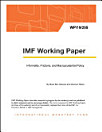The Welfare Implications of Services Liberalization in a Developing Country: Evidence from Tunisia
Mr.Nizar Jouini · Mr.Nooman Rebei
Mey 2013 · International Monetary Fund
I-Ebook
43
Amakhasi
reportIzilinganiso nezibuyekezo aziqinisekisiwe Funda Kabanzi
Mayelana nale ebook
We propose an integrated method based on a two-sector small open economy dynamic and stochastic general equilibrium model to estimate non-tariff barriers and quantify the impact of services liberalization. The major component of trade barriers is explicitly modeled through the introduction of entry-sunk costs. Hence, liberalization is treated assuming a government's policy decision aimed at reducing those costs. Then, we estimate the model using Bayesian techniques for Tunisia and the Euro Area. The paper presents a precise quantitative evaluation of services trade barriers as the difference between entry-sunk costs in Tunisia versus the Euro Area. We find significant welfare benefits in addition to aggregate and sectoral growth gains the Tunisian economy could attain following services liberalization. Surprisingly, the goods sector is the one that benefits the most from services liberalization in the short- and long-term horizons.
Nikeza le ebook isilinganiso
Sitshele ukuthi ucabangani.
Ulwazi lokufunda
Amasmathifoni namathebulethi
Faka uhlelo lokusebenza lwe-Google Play Amabhuku lwe-Android ne-iPad/iPhone. Livunyelaniswa ngokuzenzakalela ne-akhawunti yakho liphinde likuvumele ukuthi ufunde uxhunywe ku-inthanethi noma ungaxhunyiwe noma ngabe ukuphi.
Amakhompyutha aphathekayo namakhompyutha
Ungalalela ama-audiobook athengwe ku-Google Play usebenzisa isiphequluli sewebhu sekhompuyutha yakho.
Ama-eReaders namanye amadivayisi
Ukuze ufunde kumadivayisi e-e-ink afana ne-Kobo eReaders, uzodinga ukudawuniloda ifayela futhi ulidlulisele kudivayisi yakho. Landela imiyalelo Yesikhungo Sosizo eningiliziwe ukuze udlulise amafayela kuma-eReader asekelwayo.






